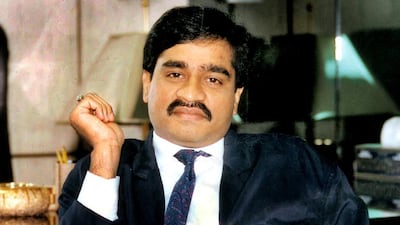NEW DELHI // One of the longstanding bones of contention between India and Pakistan that emerged in the lead-up to the cancelled talks at the weekend is Dawood Ibrahim.
Once a notorious gangster in Mumbai, Ibrahim is accused of coordinating a series of 13 bomb blasts in the city in March 1993 that killed 257 people.
He was not in India at the time, having lived in the UAE since 1986. Later, at an unknown date, he moved to Pakistan, according to India. Pakistan denies he is in the country.
Ibrahim is on Interpol’s wanted list for cheating, criminal conspiracy and organised crime. India has accused him of offences ranging from money laundering and drug trafficking to involvement in betting and fixing cricket matches.
The United States has designated Ibrahim a “global terrorist” suspected of links with Al Qaeda, the Lashkar-e-Taiba and other groups.
India has long demanded the extradition of Ibrahim from Pakistan.
“Whether we have to pursue Pakistan or pressurise it, we will not rest till Dawood Ibrahim is brought back,” Rajnath Singh, India’s home minister, told parliament in May.
In response, Abdul Basit, the Pakistani high commissioner to India, said: “The only thing I have to say about that gentleman [Ibrahim] is that he is not in Pakistan.”
Last week, Indian media published leaked details of a dossier that the government had prepared to hand over to Pakistan during the talks that had been scheduled to begin on Sunday.
The dossier is claimed to include evidence that Ibrahim rotates through nine houses in Pakistan – including one in Karachi – and that he has three passports issued to him by Islamabad.
His Karachi home “was purchased in September 2013 and is located near the hospital where medical treatment could be provided to Dawood whenever required”, the dossier read.
“This place is close to the residence of Bilawal Bhutto Zardari, son of [the late Pakistani prime minister] Benazir Bhutto.”
In his 2012 book Dongri to Dubai: Six Decades of the Mumbai Mafia, the journalist S Hussain Zaidi described another of Ibrahim's homes, also in Karachi.
“The house boasts opulent Swarovski crystal showpieces, has a waterfall, a temperature-controlled swimming pool, a tennis court, a billiard court, and a jogging track,” Zaidi wrote, citing information from his sources.
“His dapper suits are from Savile Row, London … When he is on the move, a cordon of [Pakistani paramilitary] Rangers escorts him, putting the security of the Pakistani president to shame.”
The dossier provided the addresses for Ibrahim’s houses, the serial numbers of Pakistani passports he holds and a telephone bill from April 2015 for his Karachi home, in the name of his wife Mehjabeen Sheikh.
This contradicted a statement to parliament in May by Haribhai Chaudhary, a junior minister in India’s home ministry.
“We don’t have [Ibrahim’s] address, but we know he is in Pakistan. There is no confusion,” Mr Chaudhary had said.
However, the dossier said: “Dawood is known to frequently change his locations and addresses in Pakistan. He has amassed immense property in Pakistan and moves under the protection of Pakistani agencies.”
The dossier included a recent grainy photo of Ibrahim, now 59, shorn of his famous moustache and with a receding hairline. Other documents listed the details of his family’s frequent travels this year between Pakistan and Dubai, although the dossier provided no information on whether Ibrahim himself had travelled to the UAE recently.
On Saturday, the Indian news channel Times Now telephoned Ibrahim's Karachi residence.
The TV channel said that although Ibrahim himself could not be reached, a woman who answered the phone confirmed that she was speaking from Karachi and was Ibrahim’s wife, and said that he was sleeping at the time.
The Pakistan government has not responded to reports about the dossier’s contents.
This is not the first time that India has prepared evidence for Pakistan of Ibrahim’s whereabouts. In 2001, when the then president Pervez Musharraf visited India for a summit, India’s then home minister L K Advani presented him with similar details.
Sushant K Singh, a former Indian army officer and now a New Delhi-based analyst of security affairs, believes the Indian government leaked the dossier purely for “the benefit of its domestic constituency”.
"The government wants to send a message internally, to show that it is focused on getting Dawood and that it is being strong with Pakistan," Mr Singh told The National.
“But internationally, there’s no point.”
Mr Singh said it was prbable that Interpol has had similar evidence for years.
“But Interpol has to work through that country’s police department to take any action,” he said. “And as long as Pakistan keeps denying that Dawood is there, there is nothing that anyone else can do.”
ssubramanian@thenational.ae

